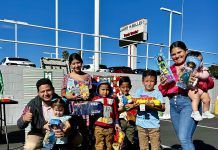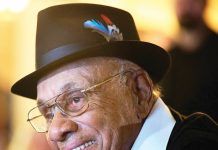![We-Carry-On-3[1]](https://eccalifornian.com/wp-content/uploads/2024/08/We-Carry-On-31-696x554.jpeg)
At the 2024 G.I. Film Festival in May, short film “We Carry On” won Best Documentary Short Film and Women’s Voice Award. Presented by the Wounded Warrior Project and Community Building Art Works, “We Carry on” follows twelve caregivers of severely wounded veterans through a six-week virtual poetry workshop as they prepare to take the stage, perform their collaborative poem, and reflect on shared experiences. The short film is now available to watch on YouTube.
Seema Reza, Community Building Art Works CEO and co-founder, said CBAW got its start as a nonprofit in the military healthcare system at Walter Reed and Fort Belvoir Community hospitals. She started at Walter Reed Medical Center in 2010.
“I am a poet and a visual artist,” she said. “What I learned in my time there was that community was the most essential piece in recovering from both emotional and physical injury. We use writing and visuals to help people figure out what it is that they contain and communicate it to the people around them. One of the things we know about post-traumatic stress disorder is that there are four primary emotions associated with PTSD. They are anger, grief, fear, and shame. Anger, grief, and shame have physical ways they leave our body, but shame requires a community.”
Reza said shame requires showing ourselves to the community and receiving from the community in “the wholeness of who you are.”
“There is so much repair that happens when we get to be vulnerable and expose what we think are our deepest, darkest secrets. The things we are ashamed to feel. The things we are afraid to show. And then to be received by the community who says they can see that in themselves, and identifying with their experiences, and we are still here for you,” she said. “That is what all our programs aim to do.”
Reza said for this project, she worked with a group of military caregivers if service members of what Wounded Warriors would call catastrophically wounded and need a lot of care.
“We gathered a group of their caregivers. They happened to be all women. Mostly spouses. But a few moms of these people who have been severely wounded in combat. We gathered virtually at first to talk about the connections to their stories through a poetry workshop. Then we took a lot of their writing and put it into a script. Wounded Warriors brought these women out to the D.C. area. We had one opportunity to rehearse the script, this collaborative poem they wrote together, and then they performed it for an audience of the public at a local theatre. It was an extraordinary thing.”
Reza said in this process, they do not only assign participants their own lines, but have them recite other people in the group’s lines so the burden of it is not on the person who said it.
“So, they were able to hear their experiences in other people’s voices,” she said. “It was a beautiful thing to see how they showed up for one another, and each of them said made it enormous impact on how they isolated they felt in the performance.”
Reza said they made the film of the entire process, and it is a beautiful documentary made by the filmmakers.
“They did a wonderful job at keeping the performance, but also keeping these people as individuals who have their own stories. People who live in this shadow of caregiving but did a beautiful job in showing their whole unique strengths,” she said. “We were really grateful to be able to watch the film with two of the caregivers. One who was a mother of a wounded warrior, and another who was the wife of a wounded warrior. It was gratifying to see them see themselves and see them able to speak to what the needs of caregivers are. There are millions of caregivers living in the U.S., not all military related. But caregiving is not always entirely rewarding because it is a 24/7-hour job. It felt extremely great to shine a light on them.”
Jeanette Ezell, a caregiver in Dayton, Ohio who participated in the film, said she has been caregiving for her husband Dwayne who has multiple sclerosis that is service connected.
“He retired from the Air Force, so I became his caregiver after retirement,” she said. “It got to the point where he just could not work.”
Ezell became part of the Elizabeth Dole Foundation Caregiver Fellows, individuals who are military caregivers who advocate, share their stories, and raise awareness about the challenges faced by military caregivers.
“It has been wonderful,” she said. “I told them my story, about Dwayne and his battle with multiple sclerosis. In spite of that, he is still trying to live a productive life. In fact, we just got back from the National Veterans Wheelchair Games. He has competed in this since 2017.”
Ezell said with her connection with the Dole Foundation, and her husband’s connection with Wounded Warrior Project, together they have been able to do many “wonderful things.”
“Wounded Warrior Project connected us with CBAW to create a caregiver documentary in Washington, D.C.,” she said. “We had a wonderful time there. We were able to express our deepest thoughts about caregiving and give them an idea of what it is like to be a caregiver. And what it is like for our veterans to be a recipient of care.”













